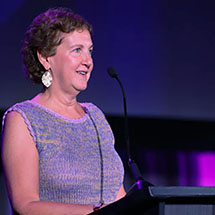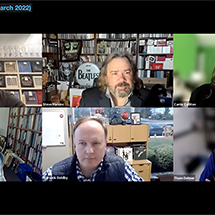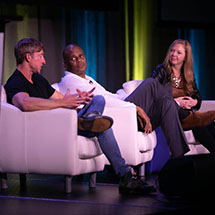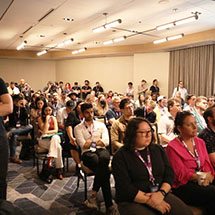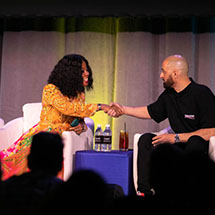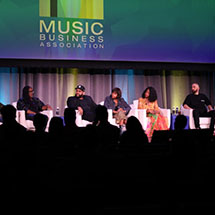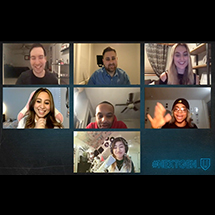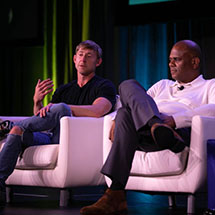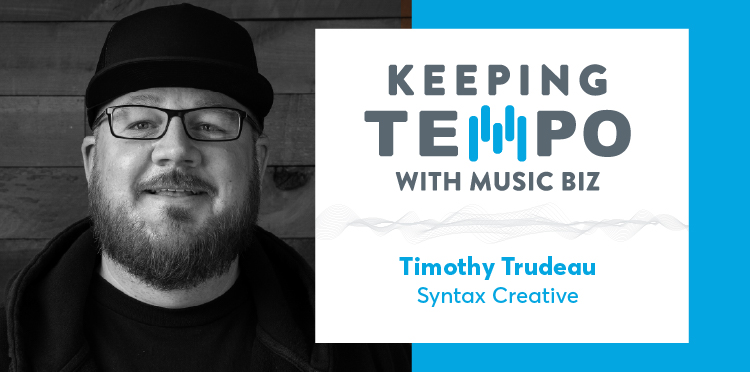
[Keeping Tempo With Music Biz] — Maintaining Fierce Independence: An Interview with Timothy Trudeau of Syntax Creative

From humble beginnings nearly three decades ago, Syntax Creative has grown into a major player in indie music digital distribution with exclusive worldwide rights to 150+ labels. However, according to Syntax CEO Timothy Trudeau, the time and experiences over the last 28 years have only strengthened the company’s ethos: doing good work for its clients while remaining nimble & independent. In our latest Keeping Tempo interview, we spoke with Trudeau about the company’s journey & growing legacy, the importance of maintaining its independence throughout its lifespan, recent partnerships to support its artist roster and bolster discovery, and much more!
Music Biz: Syntax Creative is approaching its 30th anniversary in 2027 — what has changed and what has remained the same for your company over its nearly three decades?
Timothy Trudeau: Pretty much everything on the surface has changed. We started by peddling CDs from a backpack. There’s a lot less mud in my life now, whether from music festivals in the middle of nowhere after it rained or pushing a stuck tour van while someone floored the gas. Who we negotiate with has changed too. It used to be small business owners like myself. Now I’m negotiating with the biggest companies in the world who are trying to please their shareholders.
What has stayed the same? The mission. We’ve always served independent labels and artists who need someone in their corner. We’ve always cared about the details. We’ve always brought dignity to the artist and their art. We’ve always used both sides of the brain. We care about doing things right even when no one is watching. And about pushing artists into spaces they would not reach on their own.
Music Biz: In your words, how has the role of an independent music distributor evolved since you got your start in the late 1990s?
TT: When we started, a distributor was a warehouse, forklifts, trucks and one-stops. The job was to convince everyone in the supply chain to take a chance on your music before it ever reached a listener. It was fighting over space that had physical limits: the storage room in the back, the size of the shelf in the front, and so on. Relationships with every person along the way were not just important, they were survival. And that was only inside the United States. International usually meant taking a loss, but the thrill was knowing someone halfway across the world was listening.
Now, instead of boxes and trucks, we are dealing with metadata, algorithms and licensing. Placement still matters, but now it is playlists, search results and platform visibility. The work has moved from the physical to the digital, but the weight is the same. Miss a detail and it can cost real money.
The scope has changed too. We used to serve a region. Now everything is global from day one. An independent distributor today has to understand technology, law, data and marketing at the same time. It’s not just moving product anymore. It’s making sure an artist’s catalog is built to live forever in a digital world with more music than anyone will ever be able to hear.
Music Biz: In an industry that has seen serious contraction in the last five years due to mergers and acquisitions, Syntax stands as a rare example of a company that has stayed, as you put it, “fiercely independent” — what are the benefits of and challenges to maintaining your independent nature in the music business of today?
TT: The benefit is simple: we get to decide what is right for our clients without having to answer to investors or outside shareholders. The only “shareholder” we have to keep happy is the artist or label themselves. The people making the music and telling the story are the ones we answer to, not someone from Wall Street buried in spreadsheets who never listens to the music. Independence lets us move fast, take risks, and play the long game instead of chasing the next quarter’s numbers. I often use the analogy of the Titanic versus a speedboat. If we see an iceberg, we just go around it. We’re nimble. And as a speedboat, we can also get ahead and see what is on the other side faster than the behemoths out there. I have no nautical experience, so forgive me if that makes no sense.
The challenge is also simple: we do not have the bottomless pockets that come with mergers and acquisitions. We have to be smart, creative and scrappy. Every deal matters. Every mistake costs dearly. It often feels like we’re jumping off the ledge with our clients.
But I would not trade it. Being independent means we can look a client in the eye and say we’re on their side because we actually are. That trust is worth more than whatever comfort a corporate safety net might bring. After nearly three decades, I still wake up excited to go to work every day.
Music Biz: Indie music companies are typically highlighted by “small but mighty” teams who seemingly move mountains despite their smaller size. Syntax has recently added a few new team members and announced key promotions. How have these moves benefited the company?
TT: Small but mighty is real. For years we’ve done more with less. Adding the right people and promoting the ones who have proven themselves does not just spread the workload, it multiplies our capacity. It lets us say yes to more opportunities without losing the personal touch we’re known for.
My years in artist development shaped how I manage people. I think of executives the same way I thought about artists. How do I help them grow, find their lane, and do their best work? I am not a protectionist. If someone can climb the ladder fast, I will clear the rungs. I enjoy watching people grow past anywhere I ever got.
Whether someone is with us for one year or ten, I am merely a steward. Some of our best collaborations today are with former employees who are now thriving at other companies. The scarcity mindset that tries to block people from opportunities only hurts you. You will not only lose the employee, you will also lose the opportunity to collaborate when they land a role somewhere else.
The benefit is not just inside the company either. Labels and artists feel it. They get faster answers, deeper expertise, and more proactive care. When a client notices how smooth things run, they tell another label. That funds the next round of raises. As my man Elton John put it, it is the circle of life.
Music Biz: While Syntax is known both for its roots in Hip-Hop and its deep roster of Christian music, you recently expanded into Bluegrass. Can you talk about how this move came about and the impact further diversifying your roster has had for the company?
TT: First of all, I have very diverse taste. I tend to confuse people when I play one of my own playlists and it jumps from a dubstep track pounding my speakers into a Patsy Cline classic. That plays into how I cherry-pick the labels we work with.
Throughout different eras we’ve been known as different things. We were the Hip-Hop label. More recently, we were the Bluegrass distributor. The truth is we’re neither. We’re the distributor that serves the margins. The niche. The underserved. In music, the true underground is not usually that sexy. It takes more effort to understand. Niche requires more nuance than the typical person staring at spreadsheets is willing to give. For us, we never forget there are people on the other side of those XML fields.
The principles we discovered in one niche also work in another. And thankfully the niche labels who now call us home have also noticed this.
It was not a master plan. It was hard work and consistency. After first signing Mountain Home Music Group (Crossroads Label Group) in 2008, who is still a client in 2025, other Bluegrass labels started knocking on our door. It is a great scene with dedicated fans who are more engaged than many other genres. They have their own conventions and awards. We’re honored to help that niche, among others, thrive.
Whether it’s Bluegrass, Christian, Hip-Hop, or something else altogether, we’re here to steward and serve. I’m still the same person who went without lunch so I could save my lunch money to buy music instead.
Music Biz: As traditional boundaries between artists and executives have begun to dissolve in recent years, how have the relationships between your company and those who are making music changed? Does the Syntax team see itself working more closely with artists today, or is that kind of relationship the same as it ever was?
TT: There’s a spectrum. On one end you have artists who just want to make music and not be bothered with anything else. On the other end you have artists who fixate on every single word in a Spotify pitch. We work with them all.
Our job is to fill in the gaps. If an artist wants to be hands-off, we carry more of the load. If an artist wants to be deeply involved, we step back where we’re not needed and support them where we are.
So yes, we’re closer to artists in some ways, but the truth is we’ve always adjusted to who was across the table. The relationship shifts with the client, but the mission does not.
In some cases we’ve had clients who started out on the hypervigilant side of that spectrum, but after building trust with us over time were able to let go and focus on being creative again.
Music Biz: Talking about supporting artists, Syntax recently announced an exciting partnership with Reality Co. to provide your artist clients with access to mental health resources. How did that partnership come about and what feedback have your clients given you on it so far?
TT: The relationship between Syntax and Reality Co started at an AmericanaFest speed networking event. I saw what they were doing and it lined up with what we knew our clients needed.
For me, this one is personal. I was once in a touring band, and later ran a label with artists playing more than 150 shows a year. I either experienced or watched the burnout, the marriages falling apart, the addictions, and the personal crises pile up. Back then, having access to something like this could have changed lives. So when the opportunity came to build a path where every client in our system could tap into those resources, it was a no-brainer.
The feedback has been strong. Some have already used it and told us it helped them. Others say just knowing it is available makes them feel supported. That is the whole point. We can’t play every role in someone’s life, but we can make sure help is close when they need it.
Music Biz: Late last month, Syntax confirmed that it will work with Hoopla Digital to give folks access to the company’s catalog through the public library system. Tell us your perspective on this partnership and the importance of reaching music fans outside of the commercial market.
TT: I remember the freedom I felt when I got my first library card in 1985. I could find and follow my own interests. I had the responsibility to check things out and return them. And I could walk to the library after school to handle it all by myself.
Fast forward to 2025, the library is one of the places I like to hang out with my daughters. They are sponges soaking up the recorded knowledge of the world. On one of those trips I discovered Hoopla and added it to my phone. Once I realized it was basically an all-in-one Netflix, Kindle, and Spotify super-app, I thought, “This is cool, we have to have our music in here.”
It’s another great discovery tool. We even have some artists who are also authors, so we can line up their music and books under a single profile. Someone who checks out the book can be served the music, and vice versa. Streaming is fantastic technology, and having options for how you want to do it is a luxury.
Music Biz: Looking ahead, how do you see the music distribution sector growing over the next, let’s say five to 10 years?
TT: The landscape will keep shifting. Formats will change, platforms will rise and fall, and new gatekeepers will appear. That has been true every five years since I started.
What I think will matter most is not just scale, but stewardship. Who is paying attention to the details, who is earning trust, and who is building systems that can last. There will always be new ways to move music around, but not everyone will care enough to do it right.
My hope is that in five to 10 years, distribution will be less about pipes and more about people. The pipes will get faster, cheaper, and more automated. What will set companies apart is how they serve the humans on both sides of those pipes, the artists and the fans. That is where the real growth will come.
Music Biz: More holistically, what do you see as the most important trends affecting our business as a whole in the near and distant future?
TT: There are a few. The first is attention. We live in the most distracted era in human history. Music is competing not just with other music, but with TikTok, Netflix, gaming, podcasts… you name it. That changes how discovery works, how artists break, and how long they last.
The second is business models. How a distributor makes money shapes the whole ecosystem. If a company monetizes the pipes, then their goal is to shove as much through the pipe as possible. They get paid either way. That is why we see the insane volume of music dropping every week. On the other hand, if a distributor only gets paid when the music performs, there is more incentive to filter and invest in the quality and to work on opportunities together. I’m not saying one is right or wrong — some of my best friends work at the other distributors LOL!
The third is ownership. From catalogs being sold off to artists trying to hold onto their masters, the question of who controls the rights will shape the future. Those decisions ripple for decades.
And the fourth is trust. As the tools get more automated and the data gets more overwhelming, the real differentiator will be who artists and labels trust to handle their art with dignity.
You can read past “Keeping Tempo” articles via the portal linked here. And, stay tuned for more insightful discussions from our members and partners from across the industry!

